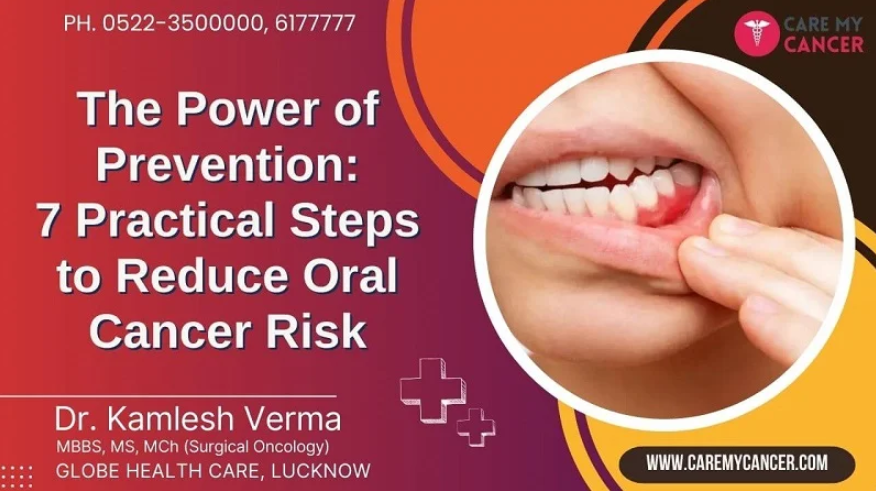Introduction
Oral cancer is a serious health concern affecting millions worldwide. However, with proactive measures and awareness, it’s possible to reduce the risk significantly. In this article, Dr. Kamlesh Verma explores 7 practical steps individuals can take to prevent oral cancer and maintain optimal oral health.
What is Oral Cancer?
Oral cancer refers to cancerous growths in the mouth, including lips, tongue, cheeks, floor of the mouth, hard and soft palate, sinuses, and throat. It’s essential to understand the risk factors and symptoms associated with oral cancer for early detection and prevention.
Identifying Risk Factors
Certain factors increase the likelihood of developing oral cancer, including tobacco use, excessive alcohol consumption, prolonged sun exposure, human papillomavirus (HPV) infection, poor oral hygiene, and a compromised immune system.
Recognizing Symptoms
Early detection of oral cancer symptoms is crucial for effective treatment. Symptoms may include persistent mouth sores, swelling, lumps, difficulty swallowing or chewing, numbness, and chronic hoarseness.
The Power of Prevention Oral Cancer Risk
Prevention plays a pivotal role in reducing the incidence of oral cancer. By adopting healthy habits and lifestyle changes, individuals can significantly lower their risk of developing this disease.
Regular Dental Check-ups
Routine dental check-ups are essential for early detection and prevention of oral cancer. Dentists can perform thorough examinations, including oral cancer screenings, to detect any abnormalities or signs of cancerous growth.
Tobacco and Alcohol Avoidance
Tobacco and alcohol consumption are primary risk factors for oral cancer. Quitting smoking and limiting alcohol intake can significantly reduce the risk of developing oral cancer and improve overall health.
Sun Protection
Prolonged sun exposure can increase the risk of lip cancer. Wearing protective clothing, using lip balms with SPF, and avoiding excessive sun exposure can help prevent lip cancer and other sun-related oral health issues.
Healthy Diet
A balanced diet rich in fruits, vegetables, and whole grains can boost immunity and reduce the risk of oral cancer. Avoiding processed foods, sugary snacks, and excessive red meat consumption can promote oral health and overall well-being.
Oral Hygiene Practices
Maintaining good oral hygiene habits, such as regular brushing, flossing, and using mouthwash, can prevent oral health issues and reduce the risk of oral cancer. Practicing proper oral hygiene is essential for overall oral health and cancer prevention.
HPV Vaccination
Human papillomavirus (HPV) infection is a significant risk factor for oral cancer. Vaccination against HPV can reduce the risk of oral HPV infection and lower the chances of developing oral cancer.
Regular Exercise
Regular physical activity is essential for overall health and well-being, including oral health. Engaging in regular exercise can boost immunity, reduce inflammation, and lower the risk of developing various cancers, including oral cancer.
FAQs (Frequently Asked Questions)
What are the early signs of oral cancer?
Early signs of oral cancer may include persistent mouth sores, swelling, lumps, difficulty swallowing or chewing, numbness, and chronic hoarseness.
How often should I visit the dentist for oral cancer screenings?
It’s recommended to visit the dentist at least twice a year for routine check-ups, including oral cancer screenings.
Can oral cancer be prevented?
While not all cases of oral cancer can be prevented, adopting healthy habits such as avoiding tobacco and alcohol, maintaining good oral hygiene, and following a balanced diet can significantly reduce the risk.
Is oral cancer curable if detected early?
Yes, oral cancer is highly treatable if detected early. Early diagnosis and prompt treatment can significantly improve outcomes and increase the chances of survival.
Is HPV vaccination necessary for oral cancer prevention?
HPV vaccination is recommended as a preventive measure against certain strains of HPV that are associated with oral cancer. Vaccination can lower the risk of oral HPV infection and reduce the likelihood of developing oral cancer.
Are there any lifestyle changes I can make to reduce my risk of oral cancer?
Yes, adopting a healthy lifestyle, including quitting smoking, limiting alcohol consumption, maintaining good oral hygiene, eating a balanced diet, and staying physically active, can help reduce the risk of oral cancer.
Conclusion
Prevention is key when it comes to reducing the risk of oral cancer. By incorporating simple lifestyle changes, regular screenings, and healthy habits, individuals can significantly lower their risk and maintain optimal oral health. Remember, early detection and proactive measures are crucial for preventing oral cancer and ensuring long-term well-being.

